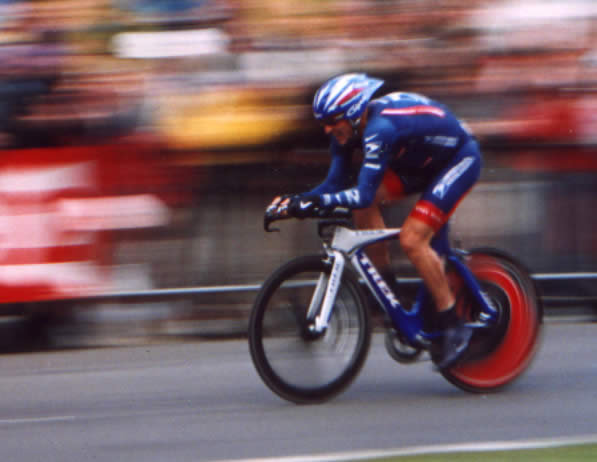Doping damages reputation of sport, attacks integrity of professions

Lance Armstrong racing in the Tour De France. All seven of Armstrong’s Tour De France titles have been stripped after it was discovered he was doping during every race.
Sport at the elite level is about maximizing performance and gaining every advantage possible within reason. To dope and use banned, performance-enhancing drugs is to knowingly gain an outlawed advantage over competitors, a condemnable action for a sportsperson to take in any circumstance.
There are so many reasons as to why doping — defined as “the use of a substance (such as an anabolic steroid or erythropoietin) or technique (such as blood doping) to illegally improve athletic performance” — is wrong. Fundamentally, it is cheating. It brings the sport into disrepute and, once they are caught, irreparably damages the reputation of athletes who choose to knowingly compromise their careers.
Doping also undermines years of training and defeats the purpose of naturally pushing and improving the human body. What is the point of training and rising to an international level if, once there, you take a shortcut and use illegal substances to beat others who are clean? It doesn’t register with me.
According to the BBC, “The most commonly used substances are androgenic agents such as anabolic steroids. These allow athletes to train harder, recover more quickly and build more muscle, but they can lead to kidney damage and increased aggression.”
This is not natural and such drugs are banned because if one athlete is taking it and another isn’t, it is both physically and humanly impossible for the clean athlete to compete with his doping opponent. Ethically, beyond the unfairness, there are short and long-term health effects, there is damage done to the reputation of sport if role-models are seen to be cheating.
On an economic level, not all countries and athletes have the same access to performance-enhancing drugs (PEDs). Legalizing drug use in sport would create a chasm and remove its beautiful unpredictability, preventing certain disadvantaged athletes and nations from being able to compete at all.
Historically, bodybuilding, athletics, and cycling have had the biggest problem with drug abuse. It is likely that athletes and mass organizations believe that they can or are getting away with it. Despite the obvious questionable conscious element to that line of thinking, the truth usually comes to light. Cheats never prosper. Just ask Russia, the nation that has become the face of sports doping in the modern era and was recently banned from the Olympics and global sports for four years.
Here in the United States, ranking as sport’s third-worst doping-affected country, there have been a number of high-profile historical cases, namely that of Lance Armstrong. The former cyclist admitted to doping throughout his career during a televised interview with Oprah Winfrey in 2013. Suitably, Armstrong was stripped of his seven Tour de France and banned from the sport for life. Just like that, the validity of his achievements and career were destroyed, along with the credibility of his sport. Before Armstrong, Canadian sprinter Ben Johnson was the sporting world’s highest-profile drugs cheat, damaging the integrity of athletics having tested positive for anabolic steroids at the 1988 Olympics in Seoul, South Korea. Within months, he was stripped of the gold and, similarly to Armstrong, his achievement stained forever.
Yet, there is another element to the doping debate which people often overlook. What about those athletes that get their medals upgraded years after competing, as a result of drug cheats being caught? Many have said that this takes away from the original achievement, or that they have a sense of trepidation accepting a medal which they should have originally been awarded on merit.
Sport must continue to fight one of the biggest threats to its credibility and continue handing out harsh sanctions until the message is unequivocal. Doping is wrong and always will be.

Hi! I am George Murray, one of the Sports Editors at Hilltop Views. I am an english literature major and journalism & digital media minor graduating...






